CPS Unit Number 035-01
Camp: 35
Unit ID: 1
Operating agency: MCC
Opened: 5 1942
Closed: 3 1946
Workers
Total number of workers who worked in this camp: 474
-
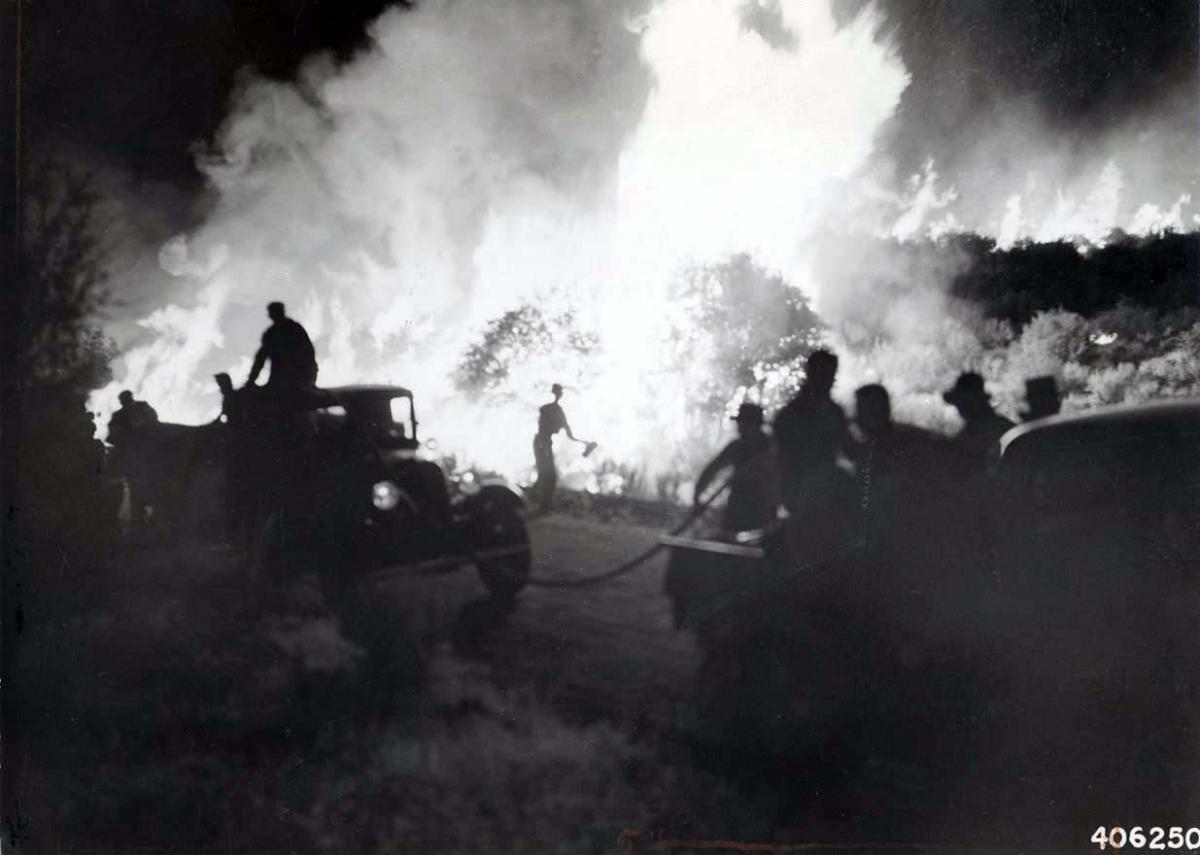 CPS Camp No. 35, North Fork, CaliforniaDeep creek fire--tank truck holding main fire front along motor way, 1940.Fred Funke; U.S. Forest Service Photo From American Friends Service Committee: Civilian Public Service Records (DG002), Swarthmore College Peace Collection, Swarthmore, Pennsylvania1940
CPS Camp No. 35, North Fork, CaliforniaDeep creek fire--tank truck holding main fire front along motor way, 1940.Fred Funke; U.S. Forest Service Photo From American Friends Service Committee: Civilian Public Service Records (DG002), Swarthmore College Peace Collection, Swarthmore, Pennsylvania1940 -
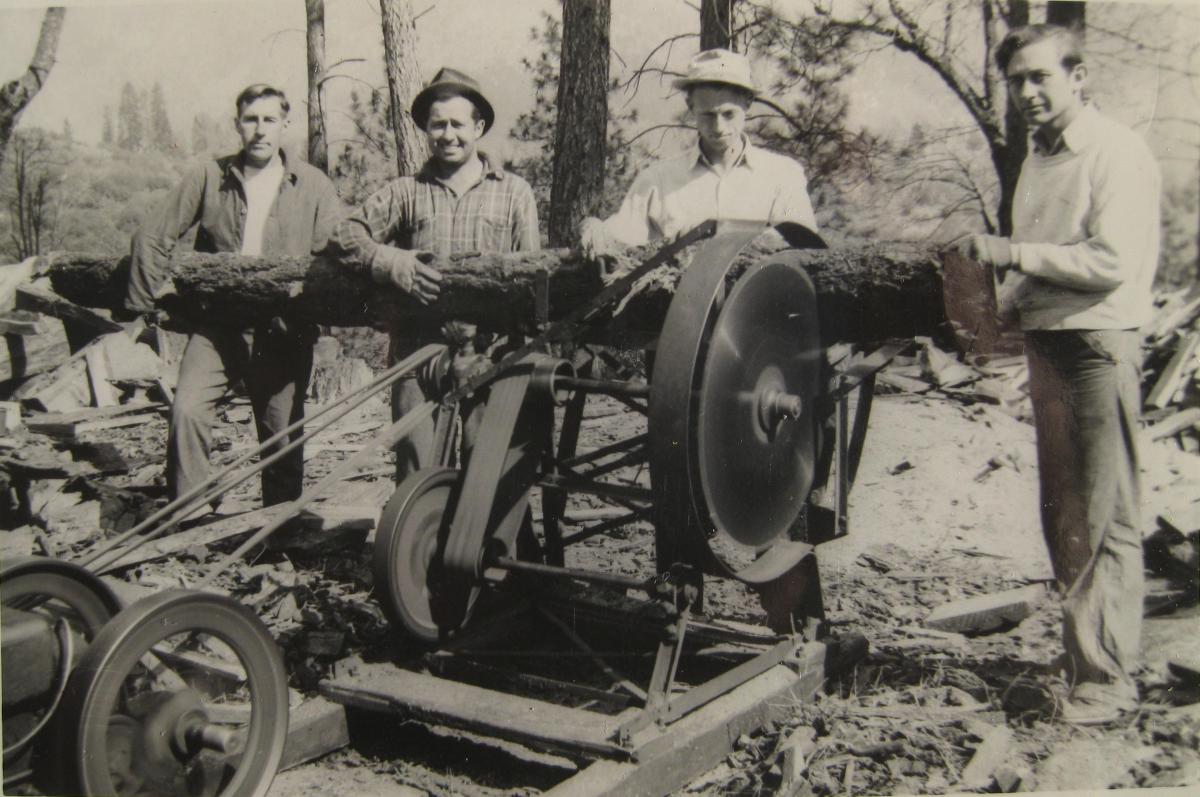 CPS Camp No. 35, North Fork, CaliforniaWalter R. Kersey, 2nd from right with light hat, North Fork Camp, CaliforniaPhoto provided by Rosemary Small, daughter1944
CPS Camp No. 35, North Fork, CaliforniaWalter R. Kersey, 2nd from right with light hat, North Fork Camp, CaliforniaPhoto provided by Rosemary Small, daughter1944 -
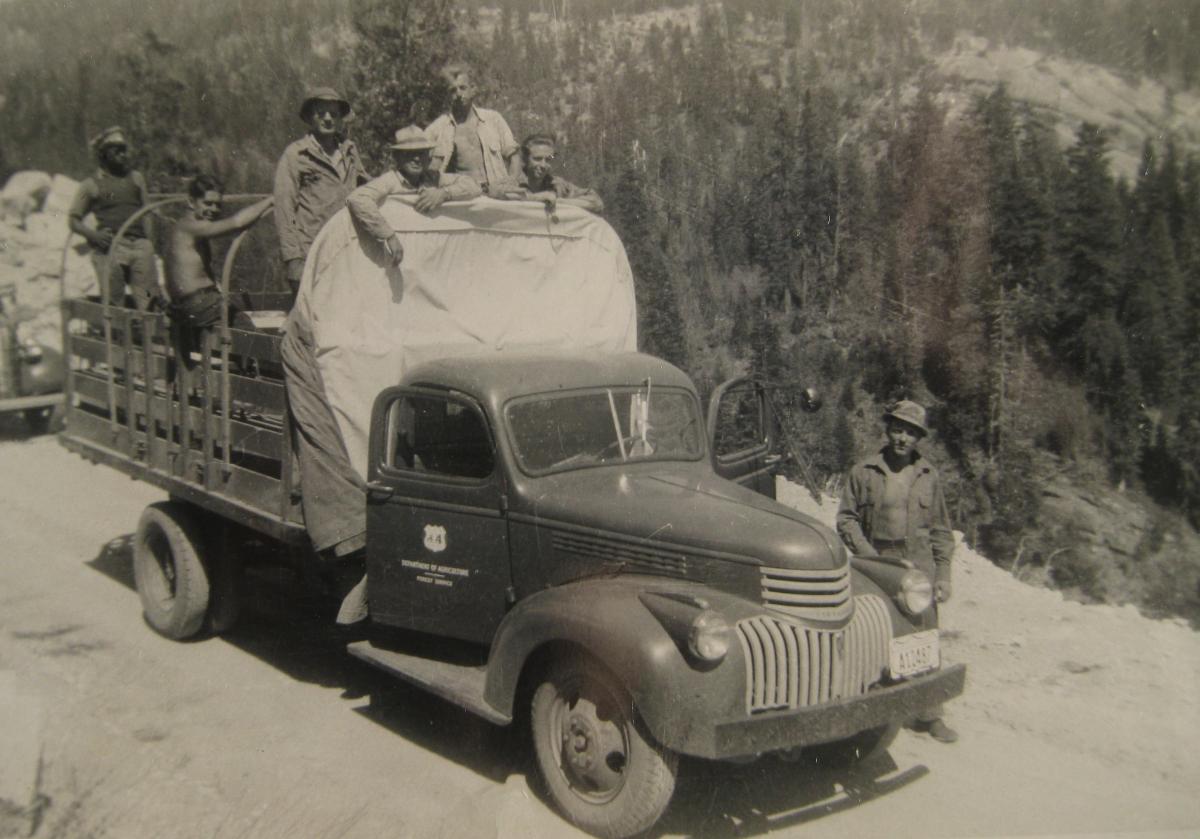 CPS Camp No. 35, North Fork, CaliforniaWalter R. Kersey, 2nd from right with open light shirt, North Fork Camp, CaliforniaPhoto provided by Rosemary Small, daughter1944
CPS Camp No. 35, North Fork, CaliforniaWalter R. Kersey, 2nd from right with open light shirt, North Fork Camp, CaliforniaPhoto provided by Rosemary Small, daughter1944 -
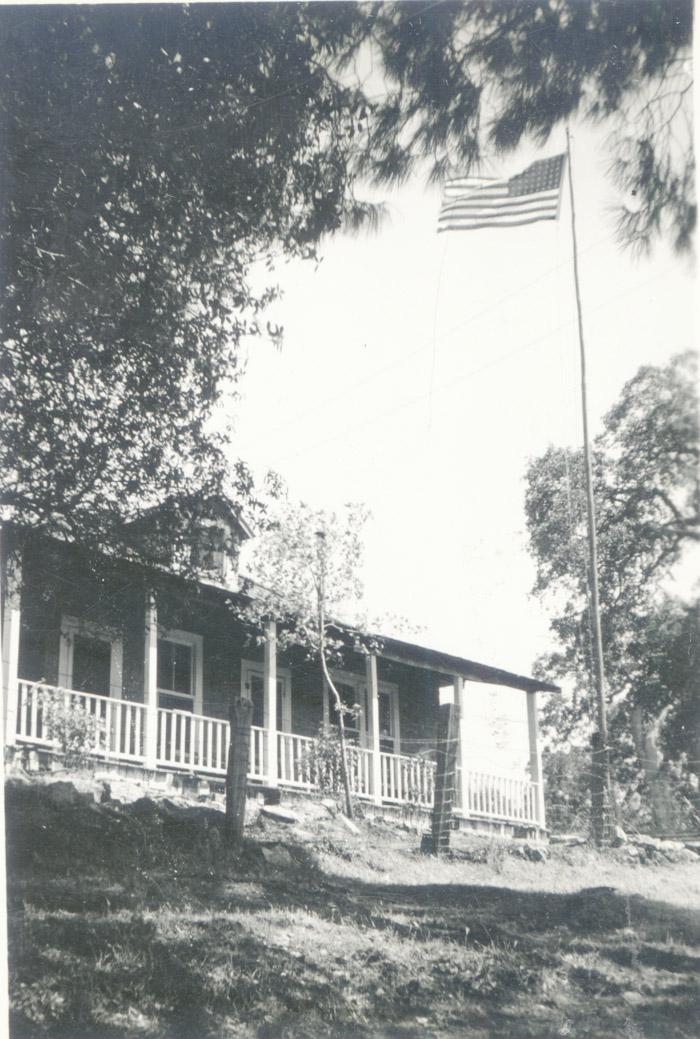 CPS Camp No. 35, North Fork, CaliforniaCivilian Public Service camp #35, North Fork, CaliforniaDigital image at Mennonite Church USA Archives, North Newton, Kansasca. 1943
CPS Camp No. 35, North Fork, CaliforniaCivilian Public Service camp #35, North Fork, CaliforniaDigital image at Mennonite Church USA Archives, North Newton, Kansasca. 1943
-
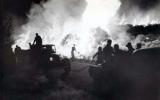 1940
1940 -
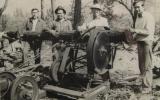 1944
1944 -
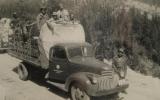 1944
1944 -
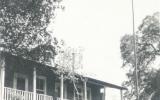 ca. 1943
ca. 1943
CPS Camp No. 35, a Forest Service base camp located in a Civilian Conservation Corps Camp northwest of North Fork, California and operated by the Mennonite Central Committee, opened in May 1942 and closed in March 1946. Men conducted fire prevention projects and fought fires, some serious.
CPS Camp No. 35, a Forest Service base camp was located in the “last abandoned” of four CCC camps that had served the Sierra National Forest a half mile northwest of North Fork, California.
North Fork was fifty miles northeast of Fresno in the foothills at 2,600 feet altitude, below the timberline, but near the base of the Sierra Nevada Mountains.
Directors: Leland A. Bachman, Sam Goosen, Leland Brenneman, Jacob Goering
Dietician: Clara Vogt, Sarah Hiebert
Matron: Jean Turner, Mrs. Leland A. Bachman
Nurse: Wilma Gilmer
Nurse-Matron: Elsie Rempel, Carol Blosser
In the Mennonite camps, the majority of the assignees reported affiliation with Mennonite denominational groups when they entered CPS.
They tended to enter from rural communities, with the majority reporting their occupations as farming or other agricultural work. On average, men in the Mennonite camps had completed 10.45 years of education, with nearly twenty-two percent having completed one or more years of college, graduated from college, or taken graduate and post graduate work. (Sibley and Jacob pp. 171-172)
The men worked to prevent fires and fought some serious fires. They erected phone lines and built bridges. “During the life of the camp, 4,689 [person] days were spent in fighting forest fires and 14,232 in fire pre-suppression work”. The latter included organizing, training, managing, equipping and maintaining fire suppression units. Men cleared dead trees and brush as part of their prevention efforts. (Gingerich p. 139)
Edwin J. Schrag from Kansas recalls his work at the camp.
Some of the work in California was to be fighting fires. There were rumors that the Japanese were going to be sending hot air balloons or blimps over, loaded with fuels to start forest fires. They needed men to be on hand to fight fires. The work there was mostly cutting underbrush and clearing fire trails. I worked in the experimental station studying erosion and rainfall. A professor from the University of California was writing a book on the topic, and the statistics we recorded were in the book. He could never have written his book without the work that the CPS men did, but when the book was published, there was no mention of how he obtained his statistics or information. This all took place in the Sierra Vista Mountains near Visalia and Reedley, California. We were about twenty miles from Yosemite National Park. (The Eden Peace Witness: A Collection of Personal Accounts pp. 134-142)
After work time, the men enjoyed the excellent recreational facilities at the camp as they were well equipped for badminton, basketball, tennis, volleyball, swimming, horseshoes, football, and softball.
While at North Fork, “some of the guys had girlfriends in the Reedley area. In fact, some of the girls became their wives.” (Edwin Schrag)
The camp enjoyed good participation in religious activities.
In addition, North Fork held a two-month cooking school under the leadership of Beth Eldridge Goering. Twenty-seven men prepared to serve not only in CPS camp kitchens, but also in post war foreign relief work.
David Anderson reports his experience during furlough time. . . .
I helped harvest fruit in the San Joaquin Valley. Staying in the homes of Japanese-Americans was a unique experience as they had been removed from their homes, a so-called wartime government security measure, and incarcerated in a relocation center in Topaz, UT. The irony and tragedy of their situation was that many of their sons were serving in the armed forces for their right to live in America.” (”Detour . . . Main Highway”: Our CPS Stories pp. 1-2)
From October 1942 through September, 1944 the men published a camp paper High Sierra Vistas. In May through July 1944, they published Demos: A Journal of Democratic Socialism. From March through June in 1945, they published Outlook.
For more information on Forest Service camps see Melvin Gingerich, Service for Peace: A History of Mennonite Civilian Public Service. Akron, PA: Mennonite Central Committee printed by Herald Press, Scottdale, PA 1949, Chapter XI pp. 125-148; religious life Chapter XVIII pp. 276-295.
For general information on CPS camps see Albert N. Keim, The CPS Story: An Illustrated History of Civilian Public Service. Intercourse, PA: Good Books 1990.
See The Eden Peace Witness: A Collection of Personal Accounts edited by Jeffrey W. Koller. Moundridge, KS: Jebeko Publishing, 2004.
For personal stories of CPS men, see Peace Committee and Seniors for Peace Coordinating Committee of the College Mennonite Church of Goshen, Indiana, “Detour . . . Main Highway”: Our CPS Stories. Nappanee, IN: Evangel Press, 1995, 2000.
See also Mulford Q. Sibley and Philip E. Jacob, Conscription of Conscience: The American State and the Conscientious Objector, 1940-1947. Ithaca, NY: Cornell University Press, 1952.
Swarthmore College Peace Collection, Camp periodicals database.